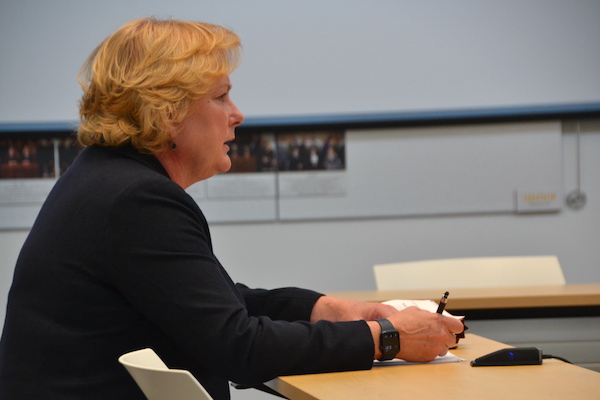Town justices push back against district court idea in Orleans County

Photos by Tom Rivers: Dawn Keppler, Shelby town justice, speaks to county legislators recently, saying a district court would be costly to local taxpayers with less accountability.
ALBION – Town justices in Orleans County say they run courts at a much lower cost with more accountability to the public than a district court.
However, a district court could provide more equitable justice over multiple municipalities. That is what District Attorney Joe Cardone and Public Defender Joanne Best see as a leading factor in taking a serious look at a district court in Orleans County. That court would serve at least two towns. It could be set up on the western end of the county, central and eastern. Or maybe the east side and west side of county.
“We’re just trying to find the best way,” Cardone said during a meeting on April 27 with county legislators and many of the local town justices. “We want to ensure justice is fair for everyone in the county. It would be remiss to not look at it. That’s why we’re entering this debate and discussion.”

Murray Town Justice Ted Spada sees much bigger court costs with salaries for the judges, clerks and security as well as upgraded court facilities.
Town justices however see a much higher expense for operating the court if it’s a district court instead of town court.
Ted Spada, a Murray town justice, presented financial numbers from the current town courts and projections for a district court. A district court judge’s salary would eb about $200,000, plus $90,000 in benefits. Court clerks are about $80,000 a year, plus $36,000 in benefits. The clerks in the town courts work about 200 hours a week so Spada said district courts throughout the county would need at least six court clerks.
Stenographers are $200 a day, with security at $270 a day, court interpreters at $1,000 a month, and rent for court facilities at an estimated $30,000 annually. The cost of computers, scanners, telephones, label makers, digital recorders, credit card machines and other equipment have not been included in the cost projections from Spada and the Orleans County Magistrate’s Association.
Spada said a district court would cost $973,726 for one serving the four central towns of Barre, Albion, Gaines and Carlton. That’s four times the current expense of $245,235 for running the courts in the four towns, Spada said. This does not include the costs of infrastructure to bring the buildings up to regulations for a district court.
Two district courts at the west end (Ridgeway, Shelby and Yates) and the central towns (Barre, Albion, Gaines and Carlton) would cost $1,947,452 versus the $451,435 in the actual town budgets for 2022, Spada told county legislators.
If there were three districts courts – west, central and east – The cost would be $2,921,177 compared to $562,127 to operate 10 town courts, and that doesn’t include the building upgrades that would be needed, Spada said.
If there were three district courts Spada said it would increase the county tax rate by $1.58 per $1,000 of assessed property or about 15 percent. The current tax rate is $10.09. The rate has gone up 60 cents in the past 10 years.
“Putting a district court in here would stifle the citizens of our county, plus all the inflation we are dealing with,” Spada said.
Cardone and Best said there would be state funding to bear much of the costs with district courts. Spada said that funding could always be pulled, leaving local taxpayers on the hook.
Best thinks one district court could serve the county. She said the discussion about district courts shouldn’t be considered adversarial with the town justices.
She and Cardone also said they don’t think the cost numbers from the Magistrates Association are accurate and should be scrutinized.
Best urged the group – legislators, justices and others involved in the court system – to keep talking and keep an open mind.
“I think it makes sense for us as a group, as leaders of the criminal justice system, to see what makes the most sense,” Best said.
Lynne Johnson, County Legislature chairwoman, welcomed the discussion on April 27. She said the local governments have made progress in sharing services and costs with the town courts. The number of local judges has decreased from 25 when Cardone started as district attorney 30 years ago to 12 now.
Shelby and Ridgeway share a courts facility at the Shelby Town Hall (with Ridgeway paying $800 a month in rent). Medina and Albion both abolished their court systems about 15 years ago with that caseload shifted to the town courts.
“I appreciate you all coming,” Johnson said during the April 27 meeting. “We need to have more discussions.”








































































